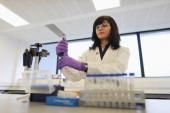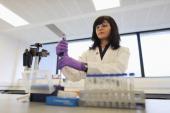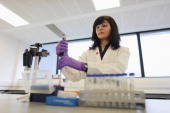The anti-doping message to all Olympians is loud and clear in London 2012: cheats have nowhere to hide, and will be named and shamed.
The International Olympic Committee (IOC) confirmed that in the last few months 100 athletes had been banned from the Games after testing positive to performance-enhancing drugs.
IOC spokesman Mark Adams said at a press conference at the start of the Games on Saturday, July 28th: “It’s always a sad day when a cheating athlete is caught. We hope this will be a message that if you are doping we'll catch you.”
“Every medal winning athlete will be tested so no-one can think they can get away,” Adams warned.
His comments came in the wake of announcing the expulsion of 20-year-old Albanian weightlifter Hysen Pulaku from the Olympics after a positive test for the banned steroid stanozolol.
Drug testing is being conducted on an unprecedented scale at London 2012 with labs testing up to 400 samples a day working around the clock.
“There are going to be 5000 tests at these Games, so no-one should think they can get away with it,” Adams said.
Adams said 1,001 total samples have been taken; 715 urine and 286 blood.
In the first few days of the Games two athletes failed the test for furosemide, a diuretic that can be used as a masking agent or for weight loss: 1500m Moroccan runner Mariem Alaoui Selsouli is facing a lifetime ban for her second doping offence; and Uzbek gymnast Luiza Galiulina also faces a provisional ban.
[Topic]With a mission to clean up sports, The World Anti-Doping Agency (WADA) introduced in 2009 the Athlete Biological Passport, an analysis of the athlete’s blood data over time to detect any irregularities associated with doping. The agency has done more than 70,000 drug tests in the six months leading up to the Olympics.
The British agency UK Anti-Doping (UKAD) conducted pre-competition tests on every one of Team GB’s 542 selected athletes leading up to the Games, and many were tested more than once, according to its website. Educating British athletes on banned and harmful substances from the World Anti-Doping Code has been a part of its WinClean campaign in the run up to the Olympics.
“Everyone involved in anti-doping, worldwide, have been working together for many months to ensure the London 2012 Games are the cleanest Games possible,” a spokesperson from UKAD said in an email.
Jacques Rogge, head of the IOC said at a press conference on Saturday, 21 July: “Definitely within our partnership with the governments in WADA we insist on a good fight against doping in all the candidates in all organising cities.
“It goes without saying. There is a programme foreseen for this period of the Games, but we are going to work with WADA in the period leading up to the Games.
“So from now on to the end of London until 2016 there will be a very strong approach not only in Brazil but also in all the other countries on the fight against doping.”
Questions were raised as to how China’s 16-year-old swimmer Ye Shiwen achieved the astonishing feat of breaking the 400m medley world record by 1 second and her fastest time by 5 seconds last Saturday.
Arne Ljungovist is Vice President of WADA. He said at the IOC and London Organising Committee of the Olympic and Paralympic Games (LOCOG) press briefing on Monday, 30 July: “I am pretty experienced in this matter, as you know, and have been at the Games since a long time and within anti-doping for 40 years.
“Should I have my suspicions I keep them for myself, first of all, and take any action, if so, in order to find out whether something is wrong or not.
“You ask me specifically about this particular swimming. I say no, I have not personally any reason other than to applaud what has happened, until I have further facts, if so.”
At present samples are kept for eight years after an Olympics, and can be tested. There are talks of having the time extended to fourteen years.
“We are aware in the UK of China’s commitment to anti-doping and that Olympic athletes and coaches vowed to reject performance enhancing substances and had to pass an exam on anti-doping in order to participate in the London Games,” UKAD said.
During the 1990s 40 swimmers from China tested positive for banned substances, and seven before the Beijing Games in 2008.
Some prohibited substances include:
• Anabolic steroids such as testosterone, stanozolol, boldenone, nandrolone – they lead to increased muscle growth and a quicker
recovery between strenuous bouts of exercise.
• Blood doping to increase red blood cell mass – increases stamina and performance.
• Continuous Erythropoiesis Receptor Activator (CERA) – to increase oxygen-carrying capacity and therefore endurance.
• Clenbuterol – to increase muscle mass while reducing body fat.
• Diuretics such as furosemide, bendroflumethiazide, metolazone – can be used as a masking agent, preventing the detection of a banned substance, and aid weight loss.
• Human growth hormone (hGH) – to increase lean mass, reduce fat and increase strength.
• Methylhexaneamine (MHA) – can promote mental and physical performance, and aid weight loss.
Source: UKAD
The Epoch Times publishes in 35 countries and in 19 languages. Subscribe to our e-newsletter.







